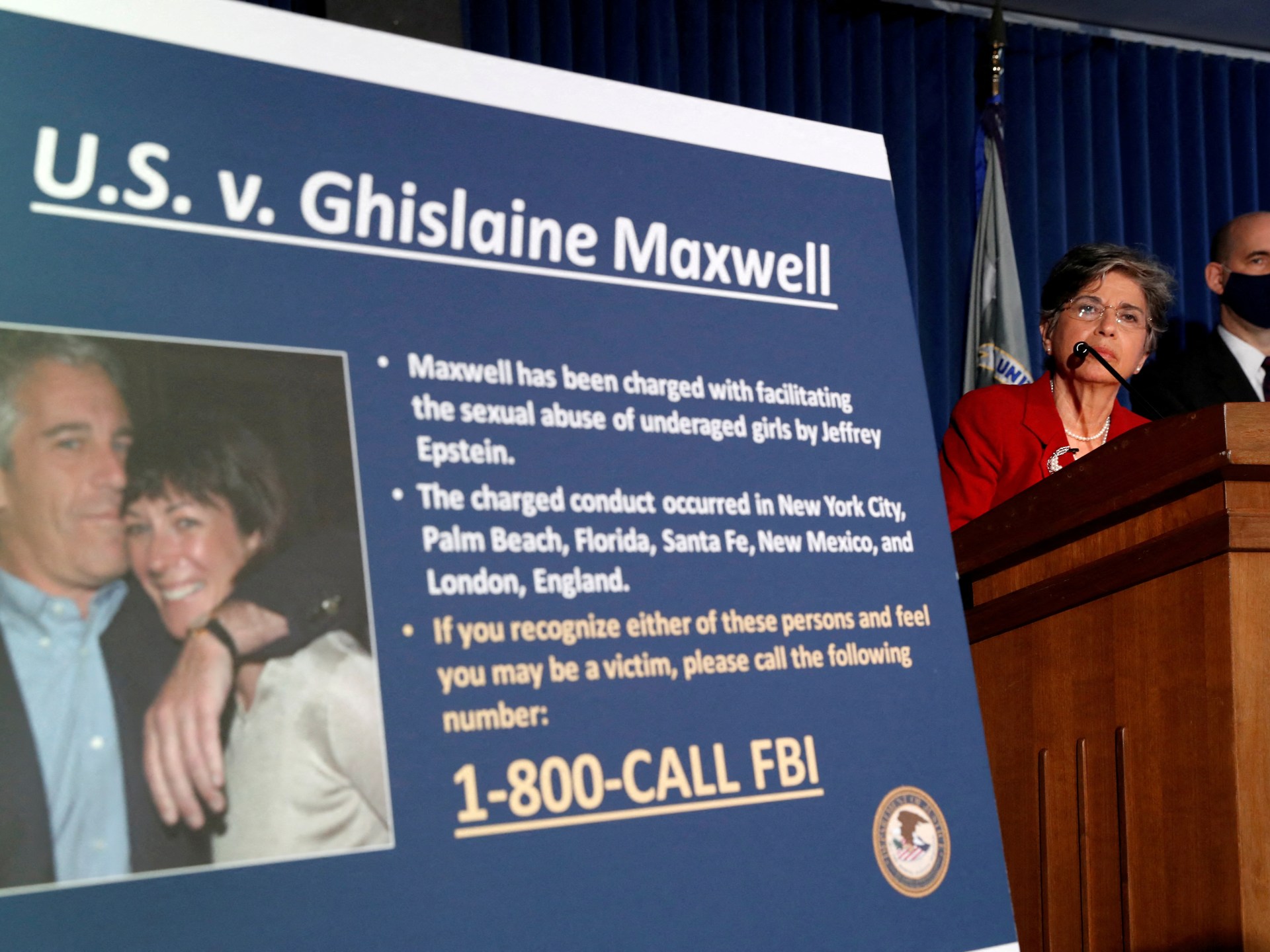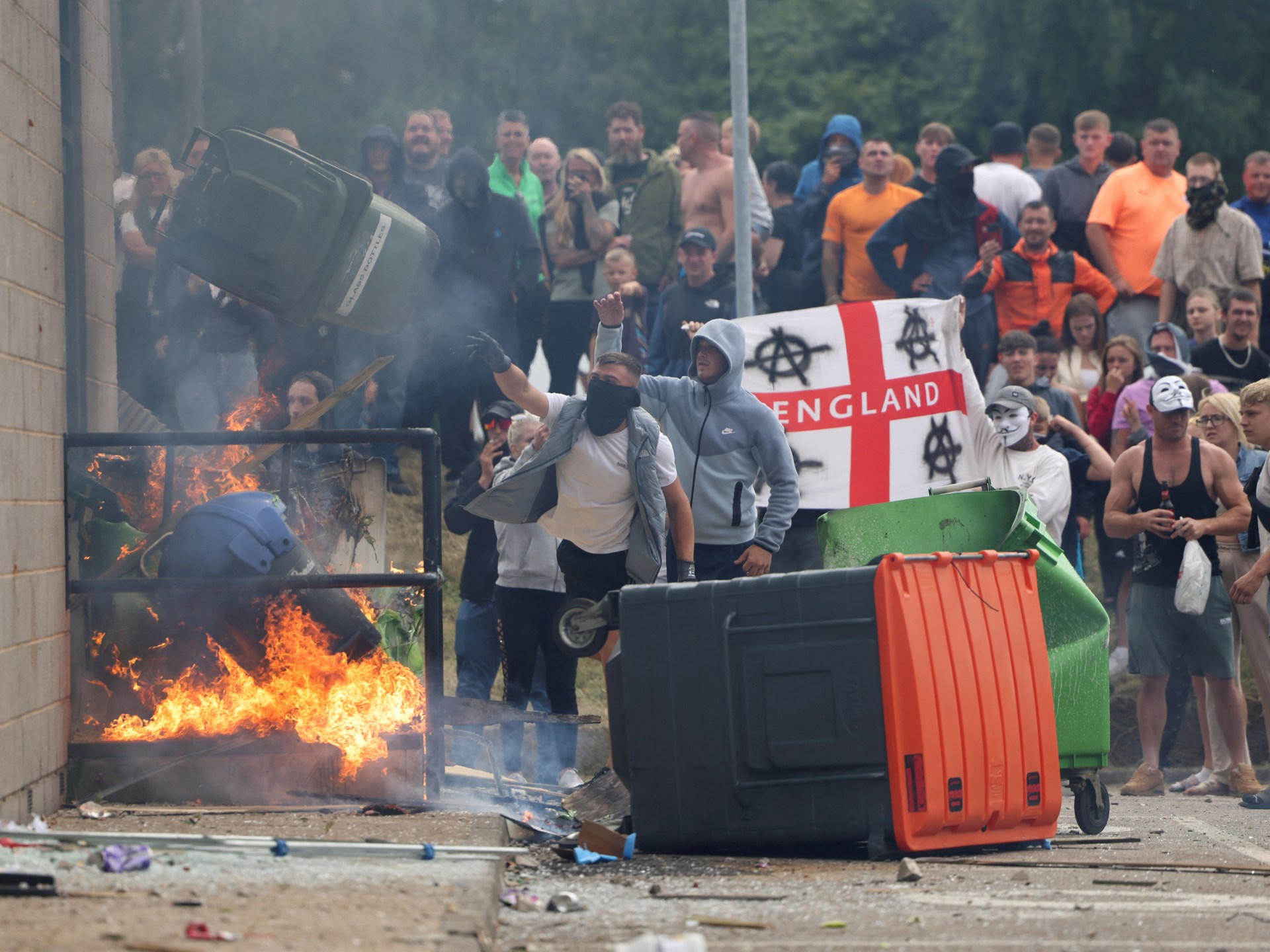Ghislaine Maxwell’s testimony says a lot about our dystopia | Politics
And so the verdict is out. United States President Donald Trump’s name has been cleared of ignominious association with the late disgraced financier and child sex abuser Jeffrey Epstein. This is according to Ghislaine Maxwell, Epstein’s former partner, who in 2022 was sentenced to 20 years behind bars on sex trafficking charges.
Earlier this year, US Attorney General Pam Bondi reportedly informed the president that his name appeared in the so-called “Epstein files”, the content of which Trump had said on the campaign trail he would be quite keen on releasing.
Once in office, however, he spontaneously decided that the Epstein case was old news, going so far as to reprimand those in his own MAGA base who were “stupid” and “foolish” enough to continue insisting that the files be declassified.
Now, the US Justice Department has released transcripts of a July interview between Deputy Attorney General Todd Blanche, a former personal lawyer for Trump, and Maxwell, who had nothing but praise for the president’s moral solidity:
“I never witnessed the president in any inappropriate setting in any way. The president was never inappropriate with anybody. In the times that I was with him, he was a gentleman in all respects.”
There was no limit, it seemed, to Maxwell’s admiration for the president. “Trump was always very cordial and very kind to me… I like him, and I’ve always liked him,” she declared.
Never mind Maxwell’s reputation as a serial liar who was charged with two counts of perjury for lying under oath – charges that were dropped following her conviction on other counts. Surely the obsequious tribute to Trump’s allegedly upstanding nature has nothing to do with the fact that Maxwell is presently seeking a presidential pardon from the same man.
At any rate, the shining appraisal should at least help un-bunch the panties of many Trump supporters who have been dissatisfied with his handling of the Epstein matter. Far-right influencer and self-categorised “proud Islamophobe” Laura Loomer, for example – whom Trump has praised as “terrific” and “very special” – welcomed Maxwell’s testimony as proof that the president “has always been an honourable person”.
Expressing her hope that “these transcripts will quell a lot of the nasty, salacious lies and rumors that were spread by bad actors online”, Loomer appeared confident that harmony would soon be restored among MAGA adherents.
To be sure, there’s nothing more uplifting than the members of a movement founded on hatred and discord getting along with each other.
For his part, Trump has now announced that he “couldn’t care less” about the US Justice Department’s release of the Epstein files to Congress.
Speaking to reporters, the president nonetheless maintained that the “whole Epstein thing is a Democrat hoax” – a result of the Democratic Party’s inability to cope with Trump’s spectacular success at the helm of America: “So we had the greatest six months, seven months in the history of the presidency, and the Democrats don’t know what to do, so they keep bringing up that stuff.”
As with most calculations emanating from the president’s brain, the proclamation of the “greatest” time period bears no correlation with reality. Indeed, pretty much everything that has transpired over the past six or seven months has been decidedly less than “great” – not that Trump’s Democratic predecessor Joe Biden presided over anything particularly inspiring.
On the domestic scene, Americans continue to be plagued by rising costs of living that for many folks make existence itself unsustainable. Basic rights like healthcare, education, nutrition, and housing have long been converted into for-profit industries, and gun violence constitutes a veritable national pastime.
Under Trump’s guidance, US law enforcement agencies have gone about abducting and disappearing undocumented workers, international scholars, and US citizens alike. The nation’s capital, Washington, DC, has also been militarised with the deployment of National Guard troops to supposedly “fight crime” in the mostly safe parts of the city.
On the international front, meanwhile, the past six or seven months have not only seen Trump bomb Iran in egregious violation of international law but also persist in sustaining Israel’s genocide of Palestinians in the Gaza Strip to the tune of billions upon billions of dollars.
Just days ago, the United Nations officially declared famine in Gaza – a logical result of the US-backed Israeli policy of enforced starvation.
And all of this against a backdrop of planetary self-combustion that is only being sped up by the Trump administration’s prioritisation of climate change denial.
Considering the rather apocalyptic panorama, Trump’s de facto character certificate from Maxwell is at best entirely irrelevant – a political soap opera in which one convicted criminal kisses the rear end of another convicted criminal who happens to be president of the United States.
Maxwell’s testimony is simply icing on the dystopian cake. And as the world goes up in flames, the character certificate at least sums up where the US is currently at – however many “greatest” months into 2025.
The views expressed in this article are the author’s own and do not necessarily reflect Al Jazeera’s editorial stance.

